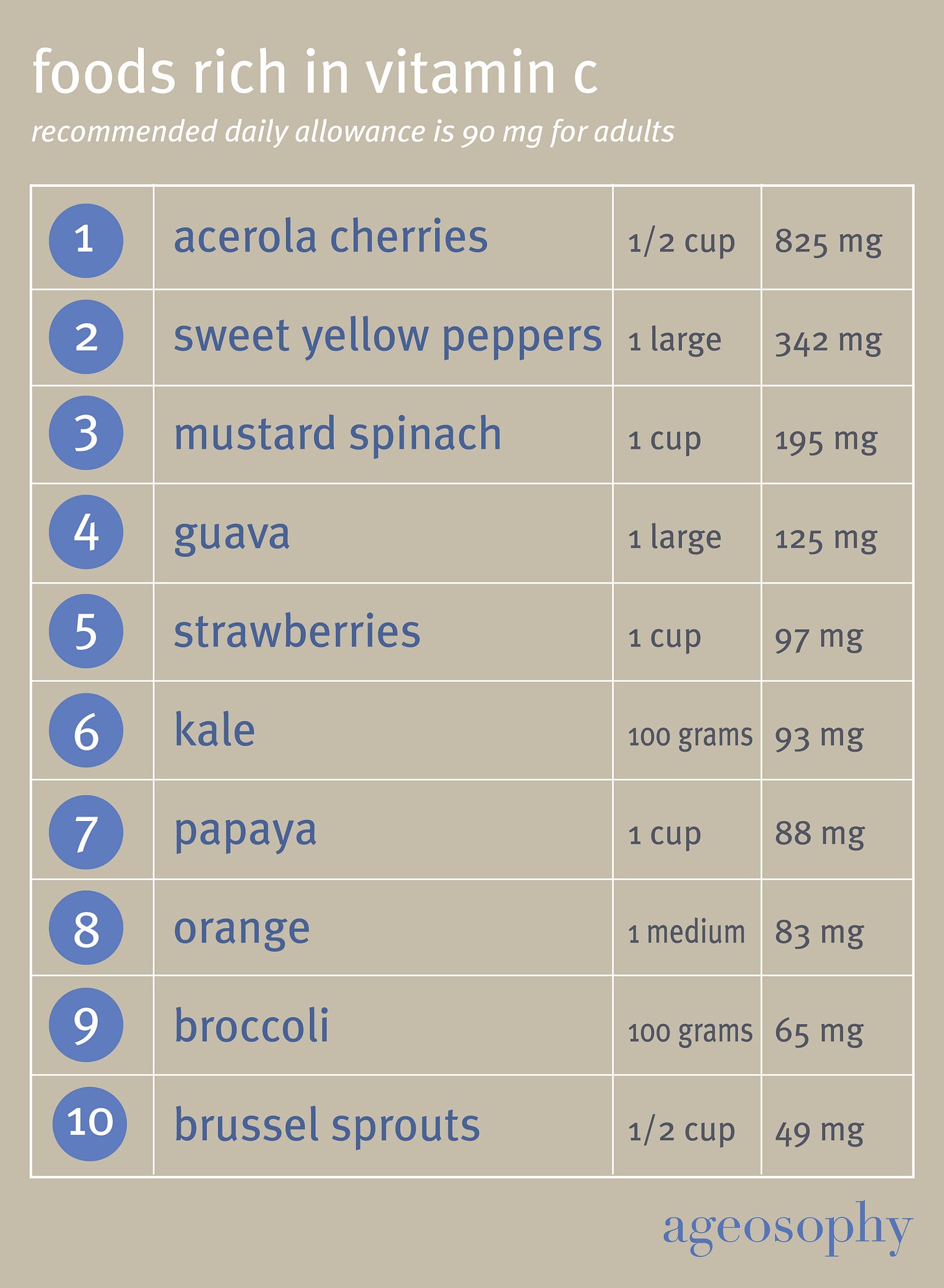I’ve had a fortuitous relationship with lemons since childhood. Some of my earliest memories are of my mom using copious amounts of lemon juice in a whole slew of things: her water, ice tea, over fish, in sauces—you name it. We were blessed with a prolific Ponderosa lemon tree in our backyard with ginormous lemons that we could almost eat like oranges, so there was a steady supply in season. She also had some sort of lemon crystals—in actuality, I think they were Vitamin C crystals, but she always called them lemon crystals—that she scooped into her water. And of course, since it was the 60’s, the big green bottle of ReaLemon—not sure how real it was, but for better or worse it was there in a pinch. I followed suit and became somewhat obsessed with lemon juice, adding it to my water and then sun tea (thank you blazing Tucson sun) to such an extent the tea was a not-so-appetizing yellow tan.
This habitual use of lemon juice continued throughout my mom’s life. She lived with us for her last 13 years, and the only thing she was absolutely insistent on, lest she became unbearably crabby, was lemon juice in her water. (The checkers at Trader Joes always commented on my weekly haul of 10-12 lemons.) In retrospect, I think she was on to something. For my entire childhood, I only recall my mom in bed with a cold one time. (Iodine nose drops may have helped too, another post…) Her first handful of years in our home, our son was going through preschool, when they bring home every nasty bug known to parents. He would get a slight sniffle, my husband and I would get clobbered and would be in bed for a week, but my 87-year-old mom never got anything. Nothing. Ever. Much to my chagrin, by the way, as she otherwise checked some fairly unhealthy boxes including being very overweight and very sedentary, while I was always working on my health. Go figure.
My mom lived, disease-free, just shy of her 97th birthday. She sailed through many a cold and flu seasons and she avoided this last big one, even though our precautions were rather lax. (I knew her constitution well.) To boot, she had amazing skin for someone who never took particular interest or care of her skin. Not even a moisturizer let alone expensive serums. I understand this is purely anecdotal, but you have to wonder if this long-term, perpetual infusion of Vitamin C into her system made a difference in her immunity and the structure of her skin. While lemons don’t crack the top 10 natural food sources of vitamin C, I have to think that the prolonged, obsessively consistent use of lemon juice—decade in, decade out—made a real difference to her overall health.
C Inside
So could Vitamin C have made a significant impact on my mom’s health? No doubt you’ve probably read and heard about the many benefits of C. As an antioxidant, it helps to protect our cells against free radicals that are linked to aging and a host of diseases. What are free radicals and why should we care? Little bit of chemistry here: free radicals are unstable molecules that are minus their full electrons. To make up for their missing electrons, they scavenge through our bodies looking to steal electrons from our healthy molecules, damaging them in the process. Essentially, antioxidants come to the rescue and sacrifice their own electrons to the free radicals, neutralizing them before they can do damage to our cells. Since damaged cells lead to a myriad of health issues, antioxidants are our heroes!
As a powerful nutrient, our body needs Vitamin C for many functions: to absorb and store iron, and to build blood vessels, cartilage and muscle. Additionally, it plays a key role in creating the primary building block of the structure of our skin: collagen, which may explain my mom’s smooth skin. In observational studies,1 it was found that higher dietary intakes of Vitamin C were associated with better skin appearance and notable decreases in skin wrinkling. And there’s more! There is emerging research that Vitamin C may be beneficial against sun damage—both from the inside and outside. Most of us don’t realize that the dermal layers of our skin actually contain Vitamin C, which naturally declines with age. It is thought that the antioxidant properties of C may help to prevent and treat the photodamage of sun’s ultraviolet rays from the inside. That’s not to say we no longer need sunscreen, but rather that Vitamin C should be an integral component in any sun protection conversation.
Since our body doesn’t make Vitamin C, it is of utmost importance to include natural, nutrient-rich whole foods in our diets because those sources of food closest to what nature intended will be the most bio-available—meaning the optimal form our bodies are able to utilize. I follow in my mother’s footsteps and juice a lemon or two a day. Although lemons aren’t in the top 10 of powerC foods, they do register a respectable 45 mg of C per half cup of juice, so I’ve got a great base towards the recommended daily 90 mg daily. Additionally, I make sure to include in my diet Vitamin C-rich foods such as strawberries, blueberries, broccoli, and kale; and for good measure, I take a naturally sourced, full-spectrum C supplement. Why naturally sourced and full-spectrum? Following the theory our bodies recognize and best utilize nutrients found in nature, I look for supplements that are concentrated forms of foods that have the minerals and bioflavonoids as they would have in their whole, natural form.
C Outside
Clearly, Vitamin C is critical to many essential functions of our bodies, but topically it is also a potent multitasker that I have been using since the early 1990s. I’ve been interested in skincare since I was a preteen, and lucky for me my first job in design was at a packaging design firm that specialized in, yes, the beauty industry. (Yay!) I remember going to a health and beauty industry conference where one of the sessions covered the introduction of exciting new ingredients including—you guessed it—topical Vitamin C, which at the time was only stabilized ascorbic acid derived from citrus. I hopped on that wagon early, using a moisturizer from one of the first manufacturers in the arena, Celex C, when it launched in 1991. I remember one of their creams was so potent it literally stung my lips and tasted a wee bit sour.
Ever since, a Vitamin C serum of some kind has been a staple in my arsenal to keep my skin healthy. I honestly can’t be without it. The benefits most touted by experts are its antioxidant properties, which combat the visible signs of sun damage by evening out skin tone and improving texture; decreasing existing wrinkles; and increasing collagen production thus helping to keep new wrinkles at bay. But a lesser-known advantage of topical Vitamin C is that it gives a level of photoprotection by delaying the burning effects of UVB exposure to skin. That’s an enormous benefit you rarely hear about.
When choosing a serum, there are several things to look for. First, the pH balance is very important to the rate of absorption, so you’ll want a product below 4.0pH. Second, light and oxygen significantly degrade Vitamin C, so it should come in a brown or violet glass bottle or a totally opaque container, and ideally with a pump, not a dropper. Droppers are bad for two reasons: number one, they allow oxygen into the bottle each time it’s opened; number two, they can transfer contaminants back into the bottle. If a company has a dropper, I nearly always pass them up unless I’m really fascinated by the ingredients, and then I put my own pump on! I never use the dropper. Third, micronutrients such as Vitamin E greatly enhance the efficacy of C (this holds true for internal consumption, as well), so look for a combination of the two, or for the winning trifecta of C, E and ferulic acid. Lastly, optimal absorption seems to be at 20%. You’ll need to work up to that if you are new to using C, and if you have been using C for a while but not a dosage that high, step up to it for better results.
Back to my lemons
The bottom line is Vitamin C is beneficial to many functions in our bodies, it boosts immunity and enhances our skin. Thanks to my mom, I’ve been hooked on lemons and the multitude of Vitamin C benefits for over 50 years. In fact, juicing a lemon is part of my daily ritual and one of the first things I do in the morning. Yes, I know there are more nutrient-dense choices (which come later in the day), but lemons give me a great base to build upon that I depend on. Every day. Every month. Every year. When I see lemons on our kitchen counter, all is well in my world.
Are you convinced but at a loss to know which products to purchase? Subscribe: I plan on writing more about the various topical C products when I launch Ageosophy Test Drive for paid subscribers in 2023. There, I’ll review and rate products on attributes from packaging to ingredients to efficacy. Please hit the subscribe button to be the first to know when it launches.
Vitamin C and Skin Health https://lpi.oregonstate.edu/mic/health-disease/skin-health/vitamin-C















